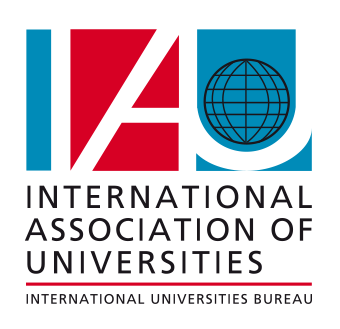The Global Voice of Higher Education
| Digital transformation of Higher Education |
 The digital transformation of society is inevitably reshaping the higher education sector and it impacts the way HEIs operate at all levels, from governance to teaching and learning, from the content of curricula to knowledge production and research activities. This constitutes an important transformation of higher education that comes both with new opportunities as well as challenges. It is an ongoing process that higher education institutions are reacting to, interacting with, shaping to remain relevant and to adapt to increasingly digitalised societies.
The digital transformation of society is inevitably reshaping the higher education sector and it impacts the way HEIs operate at all levels, from governance to teaching and learning, from the content of curricula to knowledge production and research activities. This constitutes an important transformation of higher education that comes both with new opportunities as well as challenges. It is an ongoing process that higher education institutions are reacting to, interacting with, shaping to remain relevant and to adapt to increasingly digitalised societies.
INTRODUCTION
The IAU activities in this field are organized around the following core functions:
Global advocacy
 Digital transformation is one of the four key priorities in its Strategic Plan.
Digital transformation is one of the four key priorities in its Strategic Plan.
Monitoring transformations
 As a global Association with members in all regions of the world, the IAU has a unique position to monitor trends around the world in order to favour exchange of best practices.
As a global Association with members in all regions of the world, the IAU has a unique position to monitor trends around the world in order to favour exchange of best practices.
IAU is pleased to launch the second Global Survey on Digital Transformation of Higher Education. All higher education institutions are kindly asked to contribute. For more information, please click on the tab: Global Surveys.
Catalyst for collaboration and exchange
 IAU plays an important role as a catalyst for collaboration and exchange. In the field of digital transformation and higher education, IAU seeks to pursue this mission through a series of different activities.
IAU plays an important role as a catalyst for collaboration and exchange. In the field of digital transformation and higher education, IAU seeks to pursue this mission through a series of different activities.
Interested in receiving tailored updates and initiatives on HE and Digital Transformation?
GLOBAL ADVOCACY
IAU Policy Statement
 In the context of the rapid development of digital technologies, which affects society and higher education, IAU has developed a IAU Policy Statement 2022 to outline the key principles and values that must underpin the digital transformation. This policy statement serves as the framework for the Association’s actions in this field for the period 2022-2030.
In the context of the rapid development of digital technologies, which affects society and higher education, IAU has developed a IAU Policy Statement 2022 to outline the key principles and values that must underpin the digital transformation. This policy statement serves as the framework for the Association’s actions in this field for the period 2022-2030.
Expert Advisory Group
The development of the IAU Policy Statement was steered by an Expert Advisory Group (EAG) composed of experts from different regions of the world as well as representatives of the IAU Administrative Board. It was also opened for a Membership consultation and student Associations were invited to provide their feedback and comments.
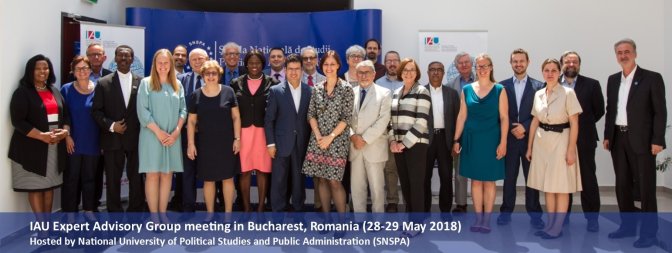 |
SITE VISITS
INSTITUTIONAL SITE VISITS
ABOUT IAU SITE VISITS
 In 2019, IAU launched the Institutional Site Visits programme. The purpose of this programme is to create opportunities for exchange among Members while meeting at a university with an advanced approach to using digital innovations to improve higher education. Members are invited to participate in these site visits to learn from experiences at the host university and to connect with peers from around the world. The aim of the programme is to foster sharing of knowledge and experience among Members and to allow participants to acquire new insights on how to leverage the digital transformation in higher education.
In 2019, IAU launched the Institutional Site Visits programme. The purpose of this programme is to create opportunities for exchange among Members while meeting at a university with an advanced approach to using digital innovations to improve higher education. Members are invited to participate in these site visits to learn from experiences at the host university and to connect with peers from around the world. The aim of the programme is to foster sharing of knowledge and experience among Members and to allow participants to acquire new insights on how to leverage the digital transformation in higher education.
The institutional site visits are held once a year.
Upcoming IAU Institutional Site Visit to Beijing Normal Univeristy on Generative AI
 The 2025 Institutional Site Visit was hosted by Beijing Normal University (BNU) in China from 20-21 August 2025. The University was pleased to welcome IAU Members to learn about their extensive experience in leveraging Artificial Intelligence (AI) to transform higher education.
The 2025 Institutional Site Visit was hosted by Beijing Normal University (BNU) in China from 20-21 August 2025. The University was pleased to welcome IAU Members to learn about their extensive experience in leveraging Artificial Intelligence (AI) to transform higher education.
AI is inevitably transforming teaching, learning, and research, presenting both significant opportunities and challenges. It has the potential to enhance educational experiences, streamline data processing, and improve the quality and efficiency of research. However, its integration also raises ethical concerns, including transparency, equitable access, data bias, potential misuse, and its impact on academic integrity. Navigating these complexities requires a fine line between exploring its benefits while addressing the risks responsibly.
China has emerged as one of the global leaders in the development of AI, and the country’s vision for AI is laid out in the in the New Generation AI Development Plan (2017) which outlines the country’s agenda up to 2030.
Beijing Normal University (BNU) grew out of the Education Department of Imperial University of Peking established in 1902, placing focus on teacher training in China’s higher education. After development for over a century, BNU has become a comprehensive and research-intensive university with disciplines in sciences and humanities, teacher education, and educational science.
 BNU has positioned itself at the forefront of AI research and education. The university actively promotes interdisciplinary AI initiatives, fosters collaboration between academia and industry, and integrates AI advancements into teaching and learning, as well as in research. BNU holds a UNESCO Chair on AI in Education and has led several initiatives on AI in support of the work of UNESCO and the objectives of the UN Transforming Education Summit on digital transformation. The university serves as an inspiring model for how higher education institutions worldwide can engage with AI to explore new educational experiences and drive knowledge creation, technological progress, and societal impact.
BNU has positioned itself at the forefront of AI research and education. The university actively promotes interdisciplinary AI initiatives, fosters collaboration between academia and industry, and integrates AI advancements into teaching and learning, as well as in research. BNU holds a UNESCO Chair on AI in Education and has led several initiatives on AI in support of the work of UNESCO and the objectives of the UN Transforming Education Summit on digital transformation. The university serves as an inspiring model for how higher education institutions worldwide can engage with AI to explore new educational experiences and drive knowledge creation, technological progress, and societal impact.
The Site Visit was exclusively open to leaders and senior leadership of higher education institutions. Beyond gaining insights from BNU, the Site Visit also offers an opportunity to discuss how AI is transforming higher education on national, regional and international levels with peers from all regions of the world.
In addition to this tailor-made IAU Site Visit, BNU also offerred the opportunity to attend their annual flagship event Global Smart Education Conference (GSE). This event brought together ministers and leaders of higher education to discuss digital transformation and innovative solutions for the future.
Previous IAU Insitutional Site Visits
Open Science at Utrecht University, the Netherlands
 The Institutional Site Visit on Open Science was hosted by Utrecht University in the Netherlands from 3 – 4 April 2024.
The Institutional Site Visit on Open Science was hosted by Utrecht University in the Netherlands from 3 – 4 April 2024.
Open Science is a movement which encourages collaborative and public research in which findings are shared at the earliest stage possible. The purpose of Open Science is to foster more transparent, collaborative, and inclusive scientific practices to make new knowledge more accessible and verifiable, to ensure more equitable access to science and knowledge, and to enhance international research collaboration.
The Netherlands has long been at the forefront of promoting Open Science, a commitment reflected first in the Amsterdam Call for Open Science in 2016 and in various subsequent policies. The adoption of Open Science throughout Dutch research centres and institutions encourages transparency, collaboration, and accessibility in research, aiming to make scientific knowledge freely available to all.
Appreciating the nation-wide adoption of Open Science policies, Utrecht University has enthusiastically welcomed the notion of Open Science. Since 2017, the University has embraced the Open Science transition in order to “accelerate and improve the realisation of research results and their societal impact.” It has implemented various initiatives to foster Open Science practices among its faculty, academics, and students, and it emphasises open access publishing, data sharing, and collaborative research and education projects, thus aligning the university with the strategy of the Dutch government to promote innovation and accelerate scientific progress through the principles of Open Science. The University thus may be seen as a prime example and source of inspiration for how higher education institutions around the world may too embrace the principles of Open Science.
Online Learning at the Universitat Oberta de Catalunya (UOC)
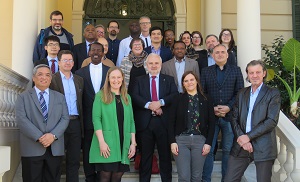 The first IAU Site Visit was hosted by Universitat Oberta de Catalunya (UOC) - the Open University of Catalonia (UOC) – which is the first fully online university worldwide. UOC welcomed 24 IAU Member representatives from 16 countries to Barcelona on 27-28 March in order to share their experience about online learning, the pedagogical and management model and its educational model based on personalization and accompanying students using e-learning.
The first IAU Site Visit was hosted by Universitat Oberta de Catalunya (UOC) - the Open University of Catalonia (UOC) – which is the first fully online university worldwide. UOC welcomed 24 IAU Member representatives from 16 countries to Barcelona on 27-28 March in order to share their experience about online learning, the pedagogical and management model and its educational model based on personalization and accompanying students using e-learning.
![]() When?: 27-28 March 2019
When?: 27-28 March 2019
![]() Where?: Barcelona, Spain
Where?: Barcelona, Spain
![]() Watch a video from the Site Visit: click here
Watch a video from the Site Visit: click here
![]() See the Agenda: click here
See the Agenda: click here
HOSTING A SITE VISIT
If you believe that your institution is a leader in this field and you wish to promote your institution and share your experience, consider hosting a site visit. Contact IAU to learn more.
Interested in receiving tailored updates and initiatives on Technology and Higher Education?
OPEN SCIENCE
 Open Science: The Challenge for Universities
Open Science: The Challenge for Universities
The IAU convened an international expert group on Open Science to identify the challenges for universities in the transition toward open science and to provide recommendations how universities can contribute to shaping the way forward. The group has collectively worked to develop the following report: Open Science: the Challenge for Universities.
About the Publication:
Universities have endured over time as centres of knowledge, adapting to significant changes in their environments. They often share the ambition of being both flexible and reflective, and at the same time remaining committed to the fundamental values of higher education and to a core mission, namely fostering critical thinking, creativity, social progress, social responsibility, inclusivity, diversity and upholding the role of arbitrators of truth through academic integrity in knowledge production respectful of various epistemological traditions.
If a new era of open science is to become an effective reality and to open new doors of possibility, universities must rise to the challenge and embed new approaches to open science within their structures and priorities. This report informs universities about the key issues and opportunities at stake in this transformation and proposes recommendations as for why and how universities can play a leadership role in supporting and shaping a new era of open science.
IAU Open Science in the News
The report was feautred in Brazilian Journal Ciência & Cultura by way of an interview with IAU Board Member and Linnaeus University Vice Chancellor Peter Aronsson and IAU Manager for Digital Transformation, Trine Jensen. Additionally, TU Wien, Austria’s Center for Research Data Management has written about the role of Open Science at the IAU 2024 International Conference in Tokyo, Japan here.
IAU Expert Group on Open Science
The recent IAU Policy Statement: Transforming Higher Education in a Digital World for the Global Common Good recognizes the principles laid out in the UNESCO Recommendation on Open Science, adopted by the UNESCO General Conference in 2021. The latter constitutes a normative and legal instrument adopted by the UNESCO Member States and encourages its implementation - in conformity with the constitutional practice of each State - and it thus serves to influence the development of national laws and practices. The IAU Policy Statement calls for universities to play an important role to shape the implementation of the UNESCO Recommendation on Open Science across the different countries of the world.
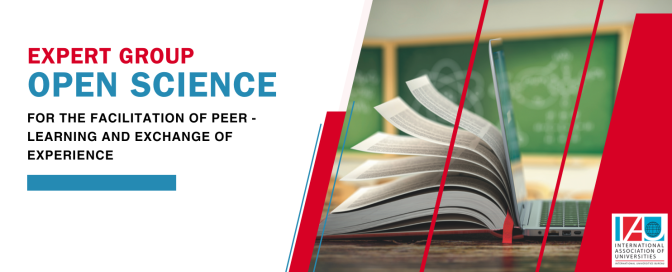 Against this backdrop, the International Association of Universities (IAU) is convening an international Expert Group on Open Science to bring together expertise and knowledge from all regions of the world to discuss and share experiences about how universities can contribute to the implementation of the norms and principles laid out in the UNESCO Recommendation.
Against this backdrop, the International Association of Universities (IAU) is convening an international Expert Group on Open Science to bring together expertise and knowledge from all regions of the world to discuss and share experiences about how universities can contribute to the implementation of the norms and principles laid out in the UNESCO Recommendation.
The IAU recognizes the following definition of Open Science laid out in the UNESCO Recommendation:
Open science is defined as “an inclusive construct that combines various movements and practices aiming to make multilingual scientific knowledge openly available, accessible and reusable for everyone, to increase scientific collaborations and sharing of information for the benefits of science and society, and to open the processes of scientific knowledge creation, evaluation and communication to societal actors beyond the traditional scientific community. It comprises all scientific disciplines and aspects of scholarly practices, including basic and applied sciences, natural and social sciences and the humanities, and it builds on the following key pillars: open scientific knowledge, open science infrastructures, science communication, open engagement of societal actors and open dialogue with other knowledge systems.”
There are numerous benefits to Open Science, most importantly democratizing access to knowledge. Science constitutes an essential pillar of society for examining, analyzing, and understanding world phenomena, developing new knowledge and insights, and exploring opportunities for addressing the challenges of today. Since most of the pressing societal challenges of today - environmental, social, and economic - are interconnected, they cannot be solved at the national or local level alone. Therefore, the purpose of Open Science is to foster more transparent, collaborative, and inclusive scientific practices to make new knowledge more accessible and verifiable; to ensure more equitable access to science and knowledge, and to enhance international research collaboration.
The Expert Group on Open Science will be tasked to develop recommendations on potential actions that can support institutions in the complex transition, share best practices and experiences, and to identify what type of research, evidence and data collection can serve universities in their transition towards Open Science.
The purpose of the Expert Group is to provide policy advice for the leadership of universities, based on the following objectives:
![]() Make Open science an institutional priority and invest in Open Science initiatives that support organizational change. For example, revising policies to include incentives for open research and data.
Make Open science an institutional priority and invest in Open Science initiatives that support organizational change. For example, revising policies to include incentives for open research and data.
![]() Build capacities and awareness about Open Science and to address issues of concern such as legal and ethical aspects around privacy, intellectual property and open licenses.
Build capacities and awareness about Open Science and to address issues of concern such as legal and ethical aspects around privacy, intellectual property and open licenses.
![]() Contribute to connecting and building infrastructure to support Open Science practices and make use of or develop repositories for information and data sharing.
Contribute to connecting and building infrastructure to support Open Science practices and make use of or develop repositories for information and data sharing.
![]() Participate in international research collaboration to build standardization that will facilitate data sharing and management practices both nationally, regionally and globally.
Participate in international research collaboration to build standardization that will facilitate data sharing and management practices both nationally, regionally and globally.
![]() Build trust in science by engaging in science communication and collaboration beyond the traditional scientific community.
Build trust in science by engaging in science communication and collaboration beyond the traditional scientific community.
![]() Identify the key challenges that hamper the transition towards open science such as predatory scientific practices that erodes the ideals of Open Science.
Identify the key challenges that hamper the transition towards open science such as predatory scientific practices that erodes the ideals of Open Science.
The Expert Group is comprised of the following members:
Chair:
Peter Aronsson, Vice-Chancellor, Linnaeus University, Sweden
Noorsaadah Abd. Rahman, Deputy Vice Chancellor (Research and Innovation), Universiti Malay, Malaysia
Batool Almarzouq, Bioinformatician and computational biologist affiliated with the Alan Turing Institute (UK) and Open Science Community Saudi Arabia (OSCSA)
Paola Andrea, Librarian, Independent Consultant, Colombia
Tina Baich, Senior Associate Dean for Scholarly Communication and Content Strategies for the University Library, Indiana University Purdue University Indianapolis, United States of America
Claudia Bauzer Medeiros, Professor, UNICAMP, Brazil
Ahmed C Bawa, Professor of Higher Education, University of Johannesburg, South Africa
Fernanda Beigel, Principal Researcher at CONICET, Head Professor, National University of Cuyo, Argentina
Geoffrey Boulton, Professor of Geology Emeritus, University of Edinburgh, Scotland
Saray Córdoba González, bio, Retired Professor, Universidad de Costa Rica, Costa Rica
Elena Denisova-Schmidt, Privatdozentin / Research Fellow, University of St.Gallen (HSG) and CIHE Boston College, Switzerland and USA
Su Nee Goh, Deputy Director and Lead for Open Science and Research Services, Office of Information, Knowledge and Library Services, Nanyang Technological University, Singapore
Carolina Guzman-Valenzuela, Professor of Higher Education, Universidad de Tarapaca, Chile
Aldrie Henry-Lee, Pro-Vice-Chancellor, Graduate Studies & Research, University of the West Indies, Jamaica
Matyas Hirman, Data Steward and Open Science Support, Charles University, Czech Republic
Alina Irimia, Open Science expert, UNESCO Chair on Science and Innovation Policies, The National University of Political Studies and Public Administration (SNSPA) and UEFISCDI, Romania
Pattarachai Kiratisin, Vice President for Research, Mahidol University, Thailand
Moumita Koley, Visiting Scholar, Indian Institute of Science, India
Ahmed Legrouri, Adjunct Professor, International University of Grand-Bassam, Côte d’Ivoire
Erivelton Nepomuceno, Assistant Professor, Maynooth University, Ireland
Takashi Okada, Vice President for Academic Research Affairs, Sophia University, Japan
Sinéad Ryan, Dean and Vice President for Research, Trinity College Dublin, University of Dublin, Ireland
Andrea Vargiu, Professor, University of Sassari, Italy
Ricardo Villegas-Tovar, Director of the International Center for International Education, BUAP, Mexico
Interested in receiving tailored updates and initiatives on HE & Digital Transformation?
GLOBAL SURVEYS
Second Global Survey on the State of Digital Transformation of Higher Education

After several years of rapid digital transformation particularly accelerated by the COVID-19 pandemic, the IAU is pleased to launch the second Global Survey on Digital Transformation of Higher Education to monitor transformations.
All higher education institutions are kindly asked to contribute.
Most higher education institutions around the world are confronted with the following challenges:
- Leveraging Digital Developments: How can digital advancements be harnessed to enhance teaching and learning, meeting the changing expectations of students?
- Exploring Generative AI: How to explore the benefits of generative AI while limiting the risks?
- Embracing Open Science: Is Open Science a priority for the institution, and if so, how to implement it in practice?
- Ensuring Cybersecurity and Data Privacy: Are the necessary measures in place to ensure a safe online environment and protect the data privacy of both staff and students?
These are the types of questions that the IAU will explore through the survey to take stock of the current state of digital transformation. The aim is to assess how ongoing technological developments are contributing to broad transformations in higher education and broad participation from higher education institutions is essential to ensure that we have ample data to monitor current trends both globally and across the different world regions.
How to participate?:
![]() We kindly ask for only one reply per institution; thus we invite you to nominate a senior staff member to collect the data from across your institution and submit it online.
We kindly ask for only one reply per institution; thus we invite you to nominate a senior staff member to collect the data from across your institution and submit it online.
![]() The survey is composed of 43 questions out of which 10 are simple demographical questions.
The survey is composed of 43 questions out of which 10 are simple demographical questions.
![]() We recommend that you download this PDF version of the survey to prepare your reply and submit the survey once you have collected the data. It will take about 30 minutes to submit the data online.
We recommend that you download this PDF version of the survey to prepare your reply and submit the survey once you have collected the data. It will take about 30 minutes to submit the data online.
![]() The deadline to complete the survey is 1 December 2024.
The deadline to complete the survey is 1 December 2024.
Expert Advisory Committee:
For the preparation of the global survey, we work with experts from different regions of the world to ensure a sound design of the questionnaire and that it resonates with all regions despite very different contexts and opportunities.
Sian Bayne, Professor of Digital Education, University of Edinbourgh, Scotland
Ainuddin Wahid Bin Abdul Wahab, Deputy Dean of Research, University of Malaya, Malaysia
Neil Butcher, Expert on OERs and Director, Neil Butcher & Associates, South Africa
Mathieu Denis, Senior Director, and Head of the new Centre for Science Futures, International Science Council
Liz Johnson, Deputy Vice-Chancellor, Academic & Alfred Deakin Professor, Deakin University, Australia
Dale Johnson, Director, University Design Institute, Arizona State University (ASU), USA
Simon-Peter Kafui Aheto, "Coordinator for the International Programmes at the College of Education, Senior Lecturer of Education and Information Technology, Department of Distance Education, School of Continuing & Distance Education," University of Ghana, Ghana
Marcelo Knobel, IAU Senior Fellow and Former President, UNICAMP, Brazil
Marcelo Milrad, Professor and Manager for the Knowledge Environment Digital Transformations, Linnaeus University, Sweden
Ilse Yuridia Muñoz, PhD Candidate and Lecturer, Benemérita Universidad Autónoma de Puebla, Mexico
Raphael Ondeko Nyonje, Associate Professor, Open Learning Programmes, University of Nairobi, Kenya
Kate Thompson, Associate Professor and leader of the Digital Learning for Change Research Group in the Faculty of Creative Industries, Education and Social Justice, Queensland University of Technology, Australia
Frank Tsiwah, Assistant Professor and AI specialist, University of Groningen, The Netherlands
Wondwosen Tamrat, President, St Mary’s University, Ethiopia
Global Survey Report on the State of Digital Transformation of Higher Education
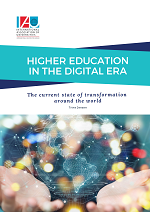 Higher Education in the Digital Era: The current state of transformation around the world - 1st IAU Global Survey Report (January 2020)
Higher Education in the Digital Era: The current state of transformation around the world - 1st IAU Global Survey Report (January 2020)
The first global survey on digital transformation was launched in 2019 and it led to the report: Higher Education in the Digital Era: The current state of transformation around the world (January 2020). This report constitutes an important source of information about the state of digital transformation prior to the COVID-19 pandemic. It is outlining the important risk of inequalities, ethical implications and the need to jointly leverage the potential of technological developments for a sustainable future.
Global Survey Report related to the the impact of the pandemic on higher education and the accelerated digital transformation
During the pandemic, IAU conducted two Global Surveys to monitor the impact of the pandemic on higher education. The two reports include important perspectives on digital transformation. The first Report was launched in May 2020 only months into the pandemic and the second Report in March 2022 based on data collected in 2021.
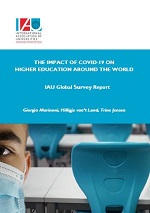 The Impact of COVID-19 on Higher Education around the World - 1st IAU Global Survey (May 2020)
The Impact of COVID-19 on Higher Education around the World - 1st IAU Global Survey (May 2020)
Almost all responding HEIs declared that they have been impacted one way or another by the COVID-19 crisis. The report presents a general assessment of the situation in universities globally and explores different aspects of the impact of COVID-19, such as: teaching & learning, research, community engagement and other key challenges and opportunities.
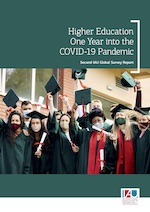 Higher Education One Year into the COVID-19 Pandemic - 2nd IAU Global Survey (March 2022)
Higher Education One Year into the COVID-19 Pandemic - 2nd IAU Global Survey (March 2022)
In 2021, the IAU conducted the Second Global Survey to monitor the impact of the pandemic on higher education. The Survey Report offers a comprehensive picture of how higher education institutions have been affected by the difficult conditions under which they were operating during the pandemic. The report covers a broad institutional perspective, looking at governance, teaching and learning, research and community/societal engagement. 496 higher education institutions from 112 countries and territories responded to the survey. The report presents the results at the global level as well as by region. It also compares trends among public and private higher education institutions. It uncovers worrisome tendencies both in terms of funding and research, but it also reveals several transformations and opportunities that may have positive effects beyond the pandemic.
For more information, please contact:
ARTIFICIAL INTELLIGENCE
The Academic Conscience and Artificial Intelligence
IAU-UNESCO LECTURE SERIES
UNESCO and the International Association of Universities (IAU) are pleased to announce the launch of an online lecture series on Artificial Intelligence and Higher Education. The series will launch on 11 September 2025 and continue over six months.
It follows the adoption of the Recommendation on the Ethics of Artificial Intelligence (2021), and seeks to explore the evolving role of universities in shaping, understanding, and responding to the profound changes brought about by AI in knowledge production, learning, governance, and ethics.
The series will consist of six online episodes. Each episode will feature one keynote speaker presenting for 20 minutes, followed by a moderated conversation with selected discussants, and an open Q&A session with the audience. This format is designed to foster participatory dialogue and multi-perspective exchange across regions and disciplines.
The series will examine both the impacts of AI on higher education and the contribution of universities to the development of AI. Instead of focusing on specific use cases, each episode will take a principled, forward-looking approach to address broader trends and dilemmas, including:
1. How Does AI Shape Human Cognition and Pedagogy?
Thursday 11th of September 4.30pm – 5.30pm (CEST)
With Duncan H. Pritchard, Professor of Philosophy, University of California
Explore how AI affects the ways we think, learn, and teach, and consider the implications for critical thinking and educational practice.
2. AI and Knowledge: Tensions between the Common Good and Commodification
Wednesday 15th of October 1pm – 2pm (CEST)
With Paul Tiyambe Zeleza, Professor of African Studies at Howard University
Interrogate the role of AI in shaping access to and ownership of knowledge and question the responsibility of higher education in preserving knowledge as a public good.
3. The Geopolitics of AI: What are the Repercussions for Higher Education?
Tuesday 25th of November 1pm – 2 pm (CET)
With Rachel Adams, Founder and CEO of the Global Centre on AI Governance
Reflect on the power dynamics shaping AI development and examine how universities can promote diversity, equity, and international collaboration.
4. AI Ethics and Standards: Balancing Universality and Diversity?
Friday 12th of December 1pm – 2pm (CET)
With Peter-Paul Verbeek, Professor of Philosophy and Ethics of Science and Technology, University of Amsterdam
Discuss the tensions between global AI frameworks and diverse academic and cultural values.
5. The Environmental Imprint of AI
(Date and speakers to be confirmed shortly)
Address the ecological footprint of AI and the role of universities in fostering responsible, sustainable innovation.
6. Higher Education as an AI Catalyst: Capacity Building, Research Advancement, and Ethical Stewardship
(Date and speakers to be confirmed shortly)
Consider how universities can shape the future of AI through talent development, interdisciplinary research, and principled leadership.
This lecture series is part of the IAU and UNESCO’s broader efforts to support Member States and universities in navigating the digital transformation of higher education while reinforcing academic freedom, ethics, and inclusive development.
Contact: HED@unesco.org and Trine Jensen (t.jensen@iau-aiu.net)
| NGO in official partnership with UNESCO in associate status |
| International Association of Universities, UNESCO House, 1 rue Miollis, 75732 Paris cedex 15, France |
| Contact | Sitemap | Terms of use | Credits |
